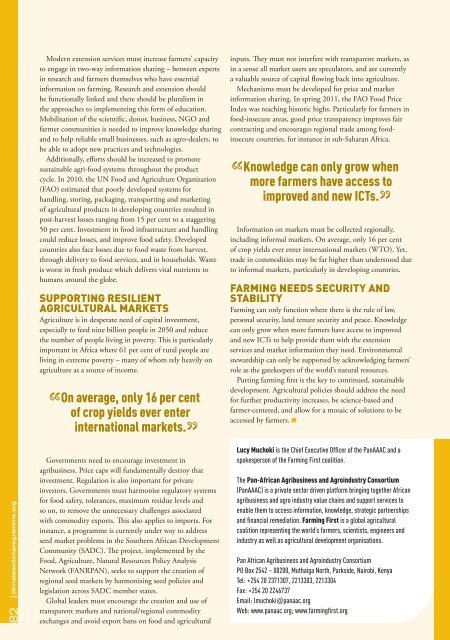Climate Action 2011-2012
Create successful ePaper yourself
Turn your PDF publications into a flip-book with our unique Google optimized e-Paper software.
Modern extension services must increase farmers’ capacity<br />
to engage in two-way information sharing – between experts<br />
in research and farmers themselves who have essential<br />
information on farming. Research and extension should<br />
be functionally linked and there should be pluralism in<br />
the approaches to implementing this form of education.<br />
Mobilisation of the scientific, donor, business, NGO and<br />
farmer communities is needed to improve knowledge sharing<br />
and to help reliable small businesses, such as agro-dealers, to<br />
be able to adopt new practices and technologies.<br />
Additionally, efforts should be increased to promote<br />
sustainable agri-food systems throughout the product<br />
cycle. In 2010, the UN Food and Agriculture Organization<br />
(FAO) estimated that poorly developed systems for<br />
handling, storing, packaging, transporting and marketing<br />
of agricultural products in developing countries resulted in<br />
post-harvest losses ranging from 15 per cent to a staggering<br />
50 per cent. Investment in food infrastructure and handling<br />
could reduce losses, and improve food safety. Developed<br />
countries also face losses due to food waste from harvest,<br />
through delivery to food services, and in households. Waste<br />
is worst in fresh produce which delivers vital nutrients to<br />
humans around the globe.<br />
supporting resilient<br />
AgriculturAl mArkets<br />
Agriculture is in desperate need of capital investment,<br />
especially to feed nine billion people in 2050 and reduce<br />
the number of people living in poverty. This is particularly<br />
important in Africa where 61 per cent of rural people are<br />
living in extreme poverty – many of whom rely heavily on<br />
agriculture as a source of income.<br />
On average, only 16 per cent<br />
of crop yields ever enter<br />
international markets.<br />
inputs. They must not interfere with transparent markets, as<br />
in a sense all market users are speculators, and are currently<br />
a valuable source of capital flowing back into agriculture.<br />
Mechanisms must be developed for price and market<br />
information sharing. In spring <strong>2011</strong>, the FAO Food Price<br />
Index was reaching historic highs. Particularly for farmers in<br />
food-insecure areas, good price transparency improves fair<br />
contracting and encourages regional trade among foodinsecure<br />
countries, for instance in sub-Saharan Africa.<br />
Knowledge can only grow when<br />
more farmers have access to<br />
improved and new ICTs.<br />
Information on markets must be collected regionally,<br />
including informal markets. On average, only 16 per cent<br />
of crop yields ever enter international markets (WTO). Yet,<br />
trade in commodities may be far higher than understood due<br />
to informal markets, particularly in developing countries.<br />
FArming needs security And<br />
stAbility<br />
Farming can only function where there is the rule of law,<br />
personal security, land tenure security and peace. Knowledge<br />
can only grow when more farmers have access to improved<br />
and new ICTs to help provide them with the extension<br />
services and market information they need. Environmental<br />
stewardship can only be supported by acknowledging farmers’<br />
role as the gatekeepers of the world’s natural resources.<br />
Putting farming first is the key to continued, sustainable<br />
development. Agricultural policies should address the need<br />
for further productivity increases, be science-based and<br />
farmer-centered, and allow for a mosaic of solutions to be<br />
accessed by farmers.<br />
82 climateactionprogramme.org<br />
Governments need to encourage investment in<br />
agribusiness. Price caps will fundamentally destroy that<br />
investment. Regulation is also important for private<br />
investors. Governments must harmonise regulatory systems<br />
for food safety, tolerances, maximum residue levels and<br />
so on, to remove the unnecessary challenges associated<br />
with commodity exports. This also applies to imports. For<br />
instance, a programme is currently under way to address<br />
seed market problems in the Southern African Development<br />
Community (SADC). The project, implemented by the<br />
Food, Agriculture, Natural Resources Policy Analysis<br />
Network (FANRPAN), seeks to support the creation of<br />
regional seed markets by harmonising seed policies and<br />
legislation across SADC member states.<br />
Global leaders must encourage the creation and use of<br />
transparent markets and national/regional commodity<br />
exchanges and avoid export bans on food and agricultural<br />
Lucy Muchoki is the Chief Executive Officer of the PanAAAC and a<br />
spokesperson of the Farming First coalition.<br />
The Pan-African Agribusiness and Agroindustry Consortium<br />
(PanAAAC) is a private sector driven platform bringing together African<br />
agribusiness and agro industry value chains and support services to<br />
enable them to access information, knowledge, strategic partnerships<br />
and financial remediation. Farming First is a global agricultural<br />
coalition representing the world’s farmers, scientists, engineers and<br />
industry as well as agricultural development organisations.<br />
Pan African Agribusiness and Agroindustry Consortium<br />
PO Box 2542 – 00200, Muthaiga North, Parkside, Nairobi, Kenya<br />
Tel: +254 20 2371307, 2213303, 2213304<br />
Fax: +254 20 2246737<br />
Email: lmuchoki@panaac.org<br />
Web: www.panaac.org; www.farmingfirst.org












